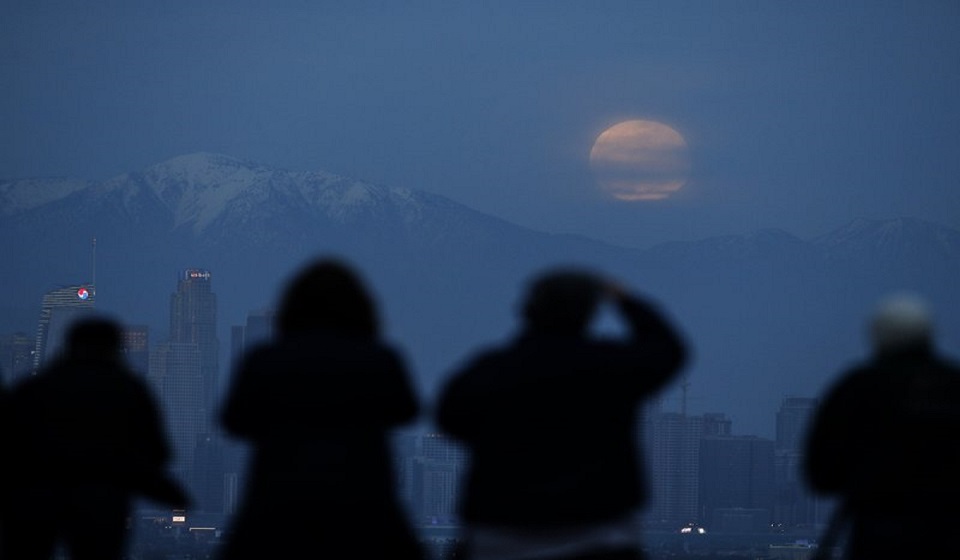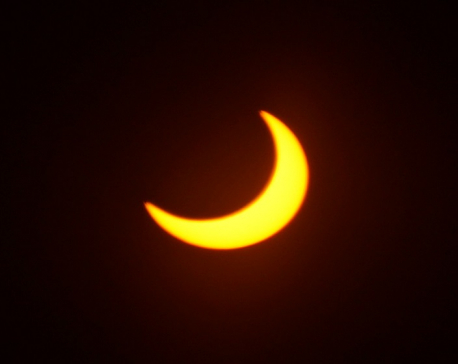
OR

KATHMANDU, NOV 19: Earth will be witnessing the longest lunar eclipse after almost six centuries today. The eclipse will be 3 hours 28 minutes 24 seconds long and this is the first time in the last 580 years that such a long lunar eclipse is going to take place. This lunar eclipse will also be the last lunar eclipse of 2021.
According to Suresh Bhattarai, chairperson of Nepal Astronomical Society (NASO), only penumbral lunar eclipse will be seen from Nepal of the partial lunar eclipse taking place today. Such an eclipse will start at 5:11 PM today and will end at 5:48 PM. Meanwhile, North America and the Pacific Ocean, Alaska, eastern Australia, New Zealand and Japan will be able to see the entire partial lunar eclipse.
If the moon is seen red from the Nepali sky today, it will not be due to lunar eclipse but only due to air pollution, according to NASO. This eclipse is the longest lunar eclipse since February 18, 1440 and will remain the longest until February 8, 2669.
There is a general belief among Hindus that people should not eat or drink anything during the eclipse period. Astrologer Kashinath Gautam argued that since negative vibrations or radiation that enters into Earth’s atmosphere during an eclipse, people are likely to be taken ill in case they dine as these radiations may enter their bodies. “No matter whether it is a solar or lunar eclipse, people should not eat, drink or even go to toilets during the eclipse,” Gautam said.
There is also a belief that pregnant woman should not watch these eclipse as there is high chance of a miscarriage. Astrologer Gautam, however, said that since the lunar eclipse that falls on the day of Kartik Shukla Purnima will not be visible from the Nepali sky, people do not need to follow any such things.
These beliefs among the Hindu people, however, are not scientifically proven. Manisha Dwa, an astro-photographer and project coordinator at NASO, said these eclipses are harmless and there is no scientific reason explaining why one cannot drink or eat during an eclipse. “Scientifically, there is no harm in eating before and after an eclipse. It all depends on how one perceives these eclipses,” she said.
“Being a Nepali myself and belonging to the Hindu community, it is a good thing when it comes to cleanliness and hygiene. But the general belief among Hindus that one cannot even drink or eat during an eclipse is something that is not proven true by science.”
Dwa also said that while making live videos about solar and lunar eclipses, they are usually eating so that they can help people come out of the traditional misbeliefs.
Chairperson of NASO Suresh Bhattarai also said that there are no such things that determine what people can do and cannot do during eclipses. “The only thing you should not do is view a solar eclipse through your naked eyes,” he said.
You May Like This

Lunar eclipse to take place on Saturday
KATHMANDU, Oct 27: As per the Nepal Calendar Determination Committee, a khandagras (partial) lunar eclipse is scheduled for this Saturday,... Read More...

'Cubes in Space' to be held first time in Nepal
KATHMANDU, March 21: Nepal Astronomical Society is to organise 'Cubes in Space' programme first time for the school level students. Read More...

NAS calls for logo for 8th national astronomy Olympiad
KATHMANDU, Jan 25: Nepal Astronomical Society (NAS) has hosted a logo competition as part of its preparation for the Olympiad.... Read More...





Just In
- MoHP cautions docs working in govt hospitals not to work in private ones
- Over 400,000 tourists visited Mustang by road last year
- 19 hydropower projects to be showcased at investment summit
- Global oil and gold prices surge as Israel retaliates against Iran
- Sajha Yatayat cancels CEO appointment process for lack of candidates
- Govt padlocks Nepal Scouts’ property illegally occupied by NC lawmaker Deepak Khadka
- FWEAN meets with President Paudel to solicit support for women entrepreneurship
- Koshi provincial assembly passes resolution motion calling for special session by majority votes






_20220508065243.jpg)






Leave A Comment